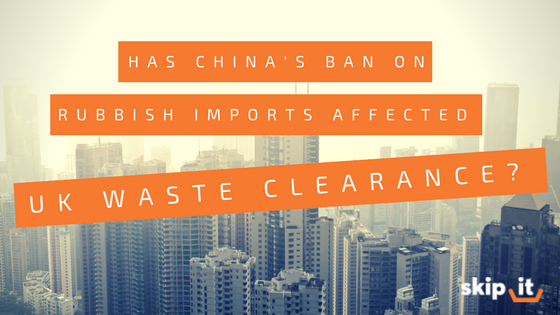Earlier this year, we reported that China had initiated an all-out ban on imports of what it described as ‘foreign garbage’. Until then, about half of the world’s waste clearance ended up in China, and two thirds of UK’s own waste went there. It’s safe to say that this has already had a big impact on waste clearance policies here at home and abroad – and will likely have even more as time progresses.
Rubbish begins to build
In the long term, it looks like we might end up sending more of our waste abroad to places like Malaysia and Vietnam. This has already started to happen, with exports to India, Turkey, Malaysia, Vietnam and Taiwan having already overtaken those to China before the ban officially came into effect this year. But no short term stopgap solutions are going to be able to account for the sheer volume of waste that found its way to China before the ban.
For that reason, the UK is currently encountering a rubbish backlog. This was noted as far back as January, and has undoubtedly gotten worse since then. Elsewhere, countries like Hong Kong and Ireland, both of whom exported over 90 per cent of their waste to China are in an even worse state.
One of the reasons we have been most affected in the UK is because we don’t tend to sort our recycling into different materials, such as metal, plastics, glass and cardboards. To potential buyers of waste, therefore, the recycling collected from countries such as the Netherlands that already has them separated is more desirable. Countries that successfully sort their recycling waste have been far less affected by the ban.
It’s clear that in the long term we’ll have to think more carefully about how we deal with our waste collection. It remains to be seen whether that involves learning to sort recycling better so it can be exported elsewhere, or finding places to reuse it here in the UK. Some officials have since warned that we may have to burn plastic waste in order to prevent a further backlog.
What does this mean for recycling?
The thing with recycling is that, as the name might suggest – it’s a cycle. The problem we’re having here is that as a country – and indeed in many other areas around the world – we usually only get as far as putting things in the recycling bin, before patting ourselves on the back and calling it a job well done.
This is reflected in the targets and proposals that the government puts forward to improve our country’s waste clearance policies. The targets all focus on having a certain proportion of recycled waste, whether that’s municipal or otherwise. They don’t tend to say much about what we do with recyclable waste once we’ve collected it. When China accepted so much of it – we had little to worry about.
But now we’re actually going to have to start thinking more carefully about the whole recycling process, creating sustainable ways to re-divert the recyclable waste we’ve collected back into our own economy, rather than exporting it straight to China.
At Skip It, we sort the waste we collect by type. And if you can help us do this, we’ll pass the savings on to your business or household. Taking the time and effort to sort waste in this way increases the amount that we can recycle. It’s all just part of our work in playing our role in delivering responsible, sustainable house clearance and business waste collection services.






